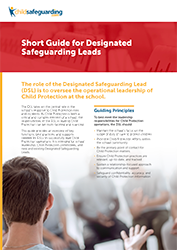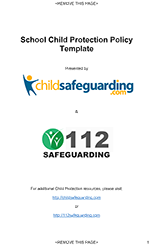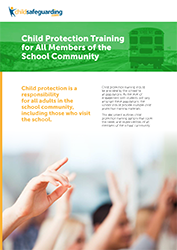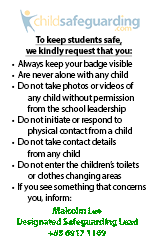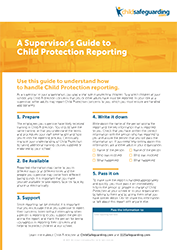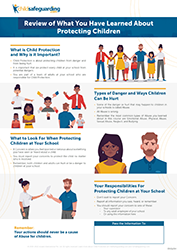Child Protection Resources
Our Child Protection training is only one part of
a robust Safeguarding program
Browse our collection of Child Protection Resources.
Child Protection and Safeguarding are vital to ensuring a school environment is Child Safe as they affect every element of the school community. However, the full scope of Child Safeguarding can be complex and challenging for schools.
As our mission is to make all schools worldwide safe for children, ChildSafeguarding.com is committed to helping schools tackle the complexities of Safeguarding. We work with schools to understand the role of our training in establishing a baseline standard of Child Protection knowledge amongst the staff. We connect schools with experts and additional training materials in Safeguarding and Child Protection.
We offer free webinars and resources to help schools and those who work with children in their work creating robust Child Safeguarding programs.
Definitions
To help develop consistent understanding and vocabulary around Child Abuse Prevention, we believe it is helpful to share these definitions:
SAFEGUARDING is the prevention of impairment to children’s physical and psychological health and wellbeing while providing circumstances that enable healthy development.
CHILD PROTECTION is the commitment and actions taken to protect children from abuse and neglect.
A few notes:
- Safeguarding and Child Protection are not synonymous.
- Safeguarding encompasses prevention of the full spectrum of potential impairment to children from minor to severe.
- Child Protection is an element of Safeguarding that focuses on abuse and neglect.
- Legal definitions of Safeguarding, Child Protection, Harm, Abuse, and Neglect vary by country. As such, the definitions above may need to be refined to match local legal standards.
- Additional definitions of key Child Protection terms may needed. Identification and definition of these terms should be done in collaboration with stakeholders to ensure they are based on the legal, cultural, and contextual needs of the community.
3 Principles of Effective Child Protection in Schools
These 3 principles can help schools create Child Protection programs that effective in protecting children from harm by involving all staff, teachers, and parents.
This video was created in conjunction with the Western Association of Schools and Colleges (WASC).
Free Child Protection Resources
In partnership with 112 Safeguarding, we have developed a set of free Child Protection resources for schools. These resources are intended to help schools and those who work with schools understand the full scope of Safeguarding and the policies, personnel, and practices needed to keep children safe.
These materials are free to download and distribute.
With exception of the Child Protection Responsibilities for a School which can be downloaded below, you will need to register for a free account to access these resources. The resources are available to download in the Resources section of the dashboard.
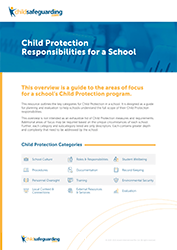
Child Protection Responsibilities for a School
This overview document outlines the key categories for Child Protection in a school. It is designed as a guide for planning and evaluation to help schools understand the full scope of their Child Protection responsibilities.
Short Guide for Designated Safeguarding Leads
The role of the Designated Safeguarding Lead (DSL) is to oversee the operational leadership of Child Protection at the school. This guide provides an overview of key functions, best practices, and supports needed for effective DSLs.
School Child Protection Policy Template
The template guides schools in the creation of their Child Protection Policy, which is the central document that defines their culture, commitments and practices regarding keep children safe from abuse.
Child Protection Training for All Members of the School Community
Child protection training should be provided by the school to all populations. This document outlines child protection training options that cover the needs and responsibilities of all members of the school community.
Child Protection ID Card Insert
These inserts are used in school badges as a reminder of the school’s Child Protection policies and requirements for adult behavior around children. They are available in printable sheets in both vertical and horizontal orientation.
Supervisor Guide to Child Protection Reporting
Supervisors may not know their duties when someone reports a Child Protection concern. This guide outlines the steps and flow of information for handling Child Protection reports. It is available in multiple languages.
ChildSafeguarding.com Course Reminder Poster
As a reminder for learners after they complete the course, this poster reviews all the key content from the course with space to include custom reporting information. It is available in multiple languages.
Essential Safeguarding Resources
Global Child Protection standards and requirements for schools are informed by these essential resources:
Media Engagements
- International Teacher Magazine – Safeguarding for All
- Best of BETT 2020 Podcast – Child Protection Training for Everyone
- Social World Podcast – Safeguarding International Schools
- Education Today Podcast – Safeguarding Students From Risks to Their Well-Being and Their Learning
- ManageBac – Child Protection Training for All Adults
- International Teacher Magazine – ChildSafeguarding.com: A Global Mission with International Roots
- International School Leader Magazine – Are All Adults in Your School Child-Safe?
- The International Educator – Child Protection Training for All Adults
For media inquiries
SCHEDULE A DEMO
What Customers Say About ChildSafeguarding.com
Executive Director, Latin American Heads Conference
The safeguarding course provided by ChildSafeguarding.com for school support staff gives an excellent basic introduction to child protection for ancillary workers. The clear delivery, wide choice of languages and straightforward and flexible user interface make it easily accessible to all. It is an important resource in enabling schools to ensure that ALL members of their communities are aware of safeguarding issues and are empowered to act.

